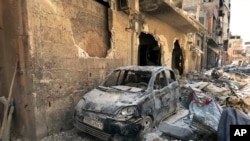The pictures of dead and wounded men, women and children in Douma, Syria, after the Assad regime, backed by Iran and Russia, fired rounds of missiles into the town’s busy marketplace in 2015, are heartbreaking. Seventy civilians were killed and 500 more injured in the October 30th attack. They are a tragic reminder of the cost of Bashar al-Assad's war against the Syrian people that has seen more than 500,000 fatalities over the last nine and a half years.
On November 9, in remembrance of the Douma victims and other the mass atrocities committed by the Assad regime, the U.S. Departments of State and Treasury sanctioned 19 individuals and entities under the Caesar Syria Civilian Protection Act of 2019 and other authorities.
The Department of State sanctioned the National Defense Forces, a pro-Assad Iranian affiliated militia, and one of its commanders, Saqr Rostrom, for their efforts to obstruct a ceasefire in Syria.
The Department of the Treasury’s Office of Foreign Assets Control, or OFAC, took action against Syrian military officials, members of the Syrian Parliament, Government of Syria entities, and Syrian and Lebanese persons attempting to revive Assad’s petroleum industry.
As Secretary of State Mike Pompeo noted in a statement, “The Administration’s sanctions…highlight how deeply the Assad regime has corrupted Syria’s institutions.” Secretary of the Treasury Steven Mnuchin also emphasized that the
Treasury Department “is determined to continue to apply economic pressure on the Assad regime and its supporters for the repression conducted by the regime.”
While those doing business with any of the 19 designated individuals and entities are now themselves at risk of being sanctioned, Secretary of State Pompeo made clear that the sanctions do not target bona fide humanitarian–related trade, assistance or activity, and that the United States government will also continue providing humanitarian aid to the Syrian people.
“The United States,” said Secretary Pompeo, “is committed to answering the Syrian people’s demand for a lasting political solution to the conflict in line with UN Security Council Resolution 2254. To that end, we support UN Special Envoy [Geir] Pedersen’s call for a nationwide ceasefire, the release of political prisoners and detainees, the drafting of a new constitution, as well as the convening of UN supervised free and fair elections.
“The Assad regime has a choice,” said Secretary Pompeo: “take irreversible steps toward a peaceful resolution of this nearly decade-long conflict or face further crippling sanctions.”














